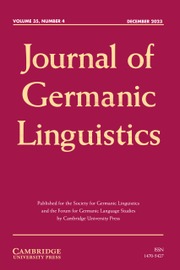Crossref Citations
This article has been cited by the following publications. This list is generated based on data provided by
Crossref.
Hartleb, Florian
2004.
Rechts- und Linkspopulismus.
p.
49.
Bornkessel, Ina
McElree, Brian
Schlesewsky, Matthias
and
Friederici, Angela D.
2004.
Multi-dimensional contributions to garden path strength: Dissociating phrase structure from case marking.
Journal of Memory and Language,
Vol. 51,
Issue. 4,
p.
495.
Haider, Hubert
2005.
How to turn German into Icelandic ? and derive the OV?VO contrasts.
The Journal of Comparative Germanic Linguistics,
Vol. 8,
Issue. 1-2,
p.
1.
Grewe, Tanja
Bornkessel, Ina
Zysset, Stefan
Wiese, Richard
von Cramon, D. Yves
and
Schlesewsky, Matthias
2005.
The emergence of the unmarked: A new perspective on the language‐specific function of Broca's area.
Human Brain Mapping,
Vol. 26,
Issue. 3,
p.
178.
Bornkessel, Ina
and
Schlesewsky, Matthias
2006.
The Role of Contrast in the Local Licensing of Scrambling in German: Evidence from Online Comprehension.
Journal of Germanic Linguistics,
Vol. 18,
Issue. 01,
Chocano, Gema
2008.
Scrambling and the Survive Principle. By Michael T. Putnam. (Linguistik Aktuell/Linguistics Today, 115.) Amsterdam: John Benjamins. 2007. Pp. ix, 216. Hardcover. €105. doi:10.1017/S1470542708000081.
Journal of Germanic Linguistics,
Vol. 20,
Issue. 3,
p.
275.
Haupt, Friederike S.
Schlesewsky, Matthias
Roehm, Dietmar
Friederici, Angela D.
and
Bornkessel-Schlesewsky, Ina
2008.
The status of subject–object reanalyses in the language comprehension architecture.
Journal of Memory and Language,
Vol. 59,
Issue. 1,
p.
54.
Fanselow, Gisbert
2008.
In need of mediation: The relation between syntax and information structure.
Acta Linguistica Hungarica,
Vol. 55,
Issue. 3-4,
p.
397.
HOPP, HOLGER
2009.
The syntax–discourse interface in near-native L2 acquisition: Off-line and on-line performance.
Bilingualism: Language and Cognition,
Vol. 12,
Issue. 4,
p.
463.
Bornkessel-Schlesewsky, Ina
Schlesewsky, Matthias
and
Cramon, D. Yves von
2009.
Word order and Broca’s region: Evidence for a supra-syntactic perspective.
Brain and Language,
Vol. 111,
Issue. 3,
p.
125.
Adli, Aria
2010.
Constraint cumulativity and gradience: Wh-scrambling in Persian.
Lingua,
Vol. 120,
Issue. 9,
p.
2259.
Oya, Toshiaki
2010.
Three types of reflexive verbs in German.
Linguistics,
Vol. 48,
Issue. 1,
Skopeteas, Stavros
and
Fanselow, Gisbert
2010.
Focus in Georgian and the expression of contrast.
Lingua,
Vol. 120,
Issue. 6,
p.
1370.
Hopp, Holger
2010.
Ultimate attainment in L2 inflection: Performance similarities between non-native and native speakers.
Lingua,
Vol. 120,
Issue. 4,
p.
901.
Bader, Markus
and
Häussler, Jana
2010.
Word order in German: A corpus study.
Lingua,
Vol. 120,
Issue. 3,
p.
717.
Schumacher, Petra B.
Piñango, Maria M.
Ruigendijk, Esther
and
Avrutin, Sergey
2010.
Reference assignment in Dutch: Evidence for the syntax–discourse divide.
Lingua,
Vol. 120,
Issue. 7,
p.
1738.
Oya, Toshiaki
2010.
Das Zustandsreflexiv – anders als das Zustandspassiv?.
zfgl,
Vol. 38,
Issue. 2,
p.
203.
Dubenion-Smith, Shannon A.
2010.
Verbal Complex Phenomena in West Central German: Empirical Domain and Multi-Causal Account.
Journal of Germanic Linguistics,
Vol. 22,
Issue. 2,
p.
99.
Frey, Werner
2010.
Ā-Movement and conventional implicatures: About the grammatical encoding of emphasis in German.
Lingua,
Vol. 120,
Issue. 6,
p.
1416.
Konietzko, Andreas
and
Winkler, Susanne
2010.
Contrastive ellipsis: Mapping between syntax and information structure.
Lingua,
Vol. 120,
Issue. 6,
p.
1436.




